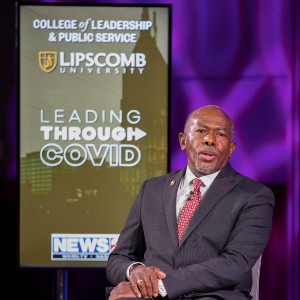City and state’s top leaders addressing COVID gather on campus
Public sector leaders of the fight against the coronavirus speak on their leadership approaches for campus, community.
Janel Shoun-Smith | 615.966.7078 |

Four of Tennessee’s top leaders guiding the state through the Covid pandemic met on the Lipscomb University campus on Oct. 29 for a discussion on leadership during the current crisis, citing sincerity, communication, humbleness and decisiveness as some of the characteristics needed to help Nashville and Tennessee weather the crisis.
The College of Leadership & Public Service’s annual Don R. Elliott Distinguished Lecture was broadcast by WKRN.com and featured:
- Dr. Alex Jahangir, a surgeon at Vanderbilt University Medical Center and chair of the Metropolitan Board of Health of Nashville and Davidson County;
- Dr. James Hildreth, president and CEO of Meharry Medical College and immunologist;
- Mike Krause, executive director of the Tennessee Higher Education Commission; and
- Mark Ezell, commissioner of Tennessee Department of Tourist Development Economic who was appointed by Tennessee governor Bill Lee to lead the state’s Economic Recovery Group to safely reboot Tennessee’s economy.
- Nikki Burdine, co-anchor of WKRN’s “Good Morning Nashville,” moderated the panel discussion titled “Leading through COVID.”
The full discussion is available here.
"Convening conversations of significance about issues impacting our communities is vitally important as we seek to learn from each other and in developing solutions," said Steve Joiner, dean of Lipscomb's College of Leadership & Public Service. "The COVID-19 pandemic has impacted communities around the world and although each community has unique needs and responses, there are also many common experiences that we have shared. It is in these challenging moments when we often learn tremendous lessons about leadership.”
The panel of experts reinforced that notion, noting that the pandemic is exactly the kind of challenge that most people drawn to public service want to tackle.

Mike Krause
“Thinking about our 200,000 students in Tennessee higher education, there is no doubt that every day is a day when we are watching numbers very closely, but we are also cognizant that this is where we are supposed to be.,” said Krause. His organization, the Tennessee Higher Education Commission, is the state’s agency charged to increase the number of Tennesseans with a post secondary education.
Hildreth, a virus scientist whose organization cooperated with the city to provide drive-through Covid testing sites, was acknowledged by everyone on the panel as a calming presence in both administrative circles and in his messaging to the public. “My job, as I see it, is to make the science accessible to people. When they understand the science, maybe they can make decisions that they wouldn’t have otherwise.”

James Hildreth
Each leader on the panel shared the leadership skills and experiences that they have found to have worked since the Covid-19 virus emerged in the U.S. in March.
“What most teams want is resolute optimism,” said Krause. “I do not run financial aid offices, administer or teach courses, but what I can do is to set a tone, that we are going to get through this. We will work together, and that will be a force multiplier throughout the organization.”
Jahangir said he learned in the first few weeks of the pandemic that public sector leadership requires a combination of the decisiveness he employs as a trauma surgeon and the collaboration and group deliberation he employs as a health administrator.
“Neither of those two skills sets in isolation will help you lead in the public sector in a pandemic,” he said. “What I have found to be most effective, is that discussion is important, but having decisiveness at the end is critical. You have to cut off the conversation and say, ‘This is what we are going to do.’ And if you have built trust through sincerity and transparency, the people who are part of this team will recognize this is a good plan and we are doing it.”

Alex Jahangir
Jahangir said he is particularly proud of the Covid testing site operations that Nashville has employed, and Ezell, who built a coalition of 15 trade associations, health scientists and the Tennessee governor’s team in the Economic Recovery Group (ERG), said he was proud of the TN Pledge reopening plan, that was looked to as a model by many other states as they later developed their re-opening plans after the spring lockdowns.
Humility and listening were two skills key to the team-building required to put the ERG together, Ezell said. His prior experiences with his Nashville-based family business, Purity Dairies, had taught him that a successful team needs diversity, truthtellers, and in the case of the pandemic—sound data, in order to reach consensus and “provide the leadership to offer hope.”
The Don R. Elliott Distinguished Lecture Series is designed to expose the Lipscomb University campus and the surrounding community to persons of influence in one or more issues of contemporary debate or discussion, with a preference for issues related to economics or political science. An endowment established at Lipscomb by the Don R. Elliott Foundation provides primary funding for the Elliott Distinguished Lecture.

Mark Ezell
Past presenters at the Elliott Lecture include Elaine Kamarck, James P. Pinkerton, Thomas Friedman, Nina Totenberg; Captain Chelsey “Sully” Sullenberger, Anders Fogh Rasmussen and Jonathan Haidt.
Lipscomb University’s College of Leadership & Public Service offers programs of study in pre-law, public service, nonprofit management, corporate social justice, government, sustainability, leadership and public service and urban studies and houses a group of institutes that serve the common good and support innovative solutions.